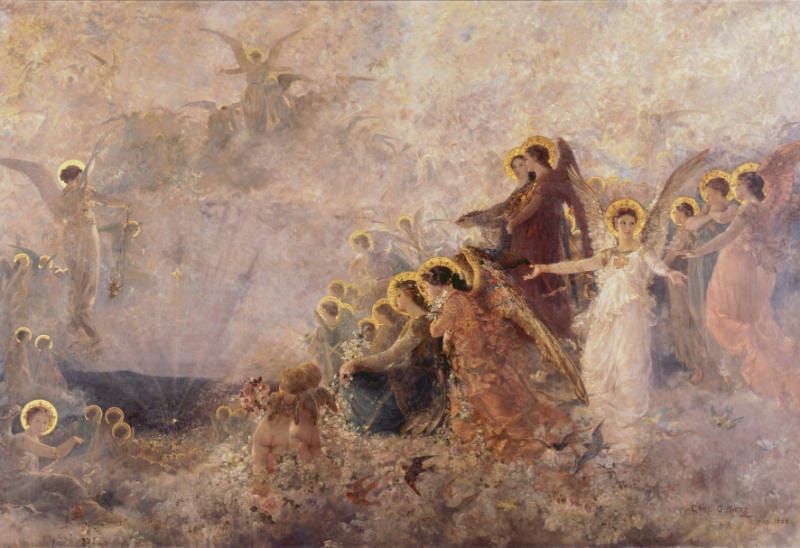On the Need for Incarnational Priors
So long as we take our human experience seriously, anything that is thoroughly arbitrary cannot be genuinely salvific.

"Before being a religious matter, compassion is a question of humanity! Before being believers, we are called to be human." ~Pope Leo XIV
In a homily a few weeks ago, Pope Leo reflected on the parable of the Good Samaritan. In calling us to be more compassionate, he appeals not only to our religious doctrine but to our shared humanity — to something, that is, more fundamental than religious belief.
That’s a striking angle, and one that I think many religious people — consciously or not — would typically reject outright. If, as some theological traditions maintain, man is so broken and depraved as to be unable even to want to help our neighbor without supernatural grace, then what is the point of appealing to our "human" sensibilities? Can we really be compassionate "before being believers?"
But those questions are, I think, non-starters. So long as we're still capable of leveling with ourselves in good faith, we all know what it is to receive compassion from someone outside the bounds of our (or any) faith tradition. And the parable itself centers precisely on this: the one who shows mercy is not the Priest or the Levite, but the Samaritan — a religious outsider.
To make sense of and practice compassion, we must admit that there exists a moral and metaphysical depth prior to the explicit experience of Christian faith. That is, there is a human drama already in motion — one into which revelation arrives not as an alien intervention, but as a sort-of fulfillment. To deny this is to risk making the claims of our faith (whatever they may be) totally arbitrary and utterable only with an enlightened grammar that doesn’t often jive with the world we human beings actually inhabit.
And this is where Pope Leo's comment has even broader implications. Because I think what he says of compassion applies, subtly but vitally, to everything else we allege is meaningful about God and Christian faith — even to incarnation itself.
Our (lack of) Incarnational Priors
If the incarnation (σαρκωθέντα, "made flesh") of God is to be something more than an arbitrary historical claim — if it is to be truly salvific for us in the state that we're actually in — it must find some epistemological footing within a cosmological imagination that precedes the categories of sin and redemption. In other words, we need some vision of ultimate reality in which God-become-man is not just some strange solution to a problem prescribed to us in a stilted and arbitrary fashion, but the very center and culmination (in an organic, and not only prescribed, way) of what it means to exist at all.
Christ came to save. But why does Christ – his death and resurrection – save? Why this mode of salvation? Why does incarnation — God taking on flesh — emerge as a possible answer to humanity’s fundamental problem as we know, personally and subjectively, the problem to be?
Of course, the the efficacy of Christ's "gospel" doesn't necessarily need some kind of defense stood up for it. It’s been two thousand years, the story persists, and millions of people around the world attest to its enduring power in their own lives. In that light, the story perhaps needs no scaffolding.
But what about the story's earliest days? What about the world inhabited by the Apostles allowed them to be so successful reaching the ears and hearts of their countrymen (and, for that matter, peoples in faraway lands)?
I suspect that a more robust cosmology is a significant part of what made these earliest Christian missionaries (like St. Paul) so wildly effective. They weren't arriving with a more-or-less random tale of a small-town mystic crucified in Roman Palestine. Stories of "messiahs" like that were not terribly uncommon, and some even came with their own rumors of post-death apparitions. The Christian proclamation was different because it spoke to existing anxieties and longings in a world already steeped in questions about divinity, meaning, the soul, and the telos of history.
The incarnation didn't drop from the sky. "Accepting" it is not merely a matter of risk and wager. Where it emerges as a viable salvific proposition, it does so, I think, out of already-fertile soil. Indeed, Immanuel ("God with us") was even anticipated (though perhaps only through a glass, darkly) by a number of Hebrew prophets spanning many centuries and epochs.
But today, evangelism often takes a different shape, and perhaps this is necessary. I know this because I've been on the receiving end of countless missionary appeals and "altar calls." The missionary starts by teaching people to have a relationship with God — as if that relationship is something to be installed, not something latent or longed for. And we typically define that God for the listener, opting for a "blank slate" approach rather than working within the religious parameters extant in a given place. Then, within that artificially constructed frame, we present the incarnation as the solution to a problem the listener didn't know they had until a few minutes prior.
But is that compelling? Can you meaningfully embrace a solution to a problem you didn't recognize until someone explained it to you?
I doubt it. Not in any enduring way.
What we need is not a better pitch, but a deeper honesty. We need to talk (and listen) seriously about our human condition and what of the cosmos that apparent to us all — not as a speculative exercise, but as a way of making sense of the world we already know. We need to level with each other, and with ourselves, as humans, most fundamentally. We need to take our human experience as seriously as we can — not by flattening it into slogans or retrofitting it into tight "Biblical worldviews," but by listening to it, testing it, and allowing it to shape our theological imagination.
Only then can the incarnation possibly begin to carry real existential weight. Only then could it possibly have the ingredients to become, as it alleges to be, eternally compelling – not as a dogma to be accepted on authority, but as a mystery that actually clarifies the very structure of reality, and ideally for everyone and every life experience, in one way or another.
Incarnation should somehow beckon to some intuition we already have.
Even for those who remain uncertain about the historical particulars of Jesus, I think this makes the idea of God become man profoundly resonant. It is no longer an arbitrary claim, but an unveiling of what it means to be human – that is, of what it means to have the experience we are all already having.





